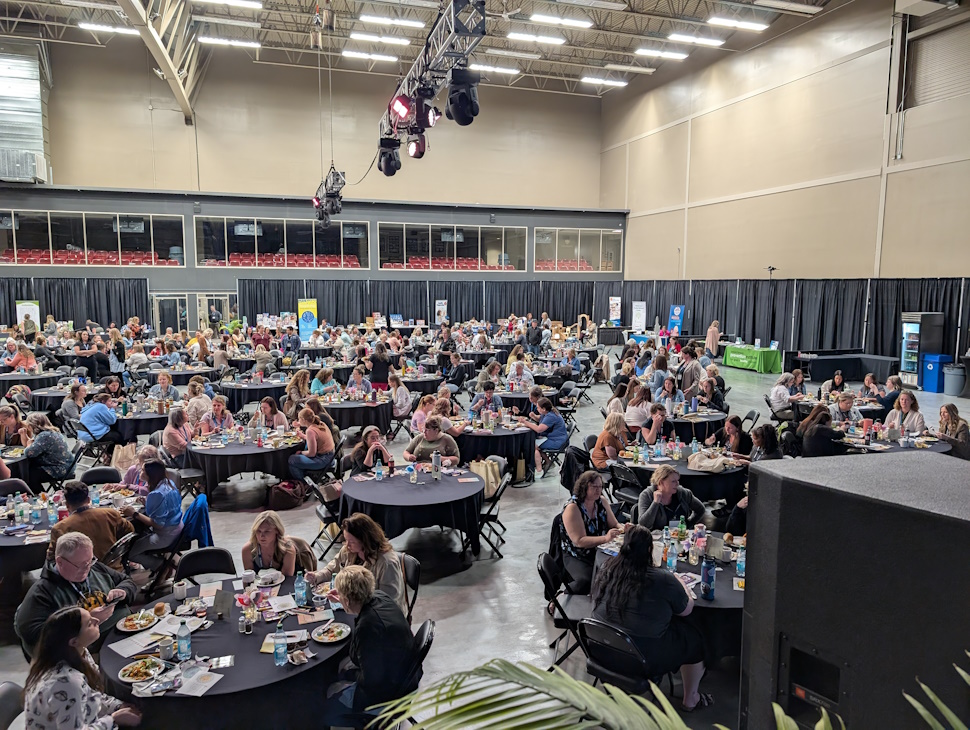Approximately 500 teachers, educational assistants, parents, daycare operators, physicians, and school division administrators have gathered to the Temple Garden Centre this week to hear from an international panel of childhood experts, including Dr. Layne Pethick, Dr. Sarah Aiono, and Dr. Jean Clinton.
Moose Jaw’s International Early Years Learning Conference is themed Believe in Our Future, and speakers were invited who could speak to the research-based, holistic development of children ages 0-8.
The conference also features Dr. Mark Tremblay, musician Jim Gill, autism speaker Kim Clairy, and local Indigenous knowledge keeper Lyndon Linklater.
Although most attendees were relatively local, some came from across Canada and beyond. There were 16 vendors on hand with a variety of childhood learning products.
“It’s buzzing, it’s really nice to see this many people that are here for early years educating and for understanding more about what our youngest children need,” said Dr. Aiono, who hails from Hawke’s Bay, New Zealand, where she has her own educational consulting company (Longworth Education). She works with school divisions around the world, as well as working extensively with her local schools.
“To be able to have the numbers that they’ve got here, I think, should be really celebrated,” she added. “The message, for anyone that wants to hear it, is that we need to be able to protect play in an age when we’re being asked to be very rigourous. And educational rigour is that translated into this idea that we need to have more testing, we need to have more accountability, and more ‘measured outcomes’, and to do more of things that actually are just not working for kids.”
Aiono said that without conferences like these, early years education researchers like her can often feel they’re in a silo — that no one is listening. It’s encouraging to see so many people interested, she said, and to meet with fellow ‘play teaching’ advocates, but it’s also frustrating to hear the same stories from international colleagues: That the old-school ideology of discipline, strictness, and competing for test scores is still strong.
“We’re all saying the same things, but we need people to hear it multiple times,” she said. “We know what works for children, we know how their little brains work, and we need to be doing more of that instead and not doing practices that are counterproductive to how our children learn.”
Dr. Layne Pethick was born and raised in Moose Jaw and said coming home is always the best feeling. As an educational consultant and researcher for the Texas Education Agency, he presents at conferences across North American all the time.
“I don’t think I’ve seen a post-COVID conference this big anywhere, all through the States where I’ve been to,” he noted. “To see this many people come out because they want to hear this information ... it’s exciting. The hope is you take a bit of it back and you start making that little change.
“We just want to see better programming for our children — well, I’ll rephrase: We want to see more developmentally appropriate programming, programming that is built for children, not for adults. In the United States, we have a big problem. Everything is built around what adults want to see and not what’s good for kids.”
Pethick said that in his opinion, the United States is the poster child for letting adults compete with each other — using children as proxies.
“It’s a sort of weird competition between grown adults and test scores. Like, ‘I have to have better test scores than you,’ and we’ve got to get off of that crazy train. ... If we can offset that (trend) anywhere else in the world, that’s what we want.”
Dr. Jean Clinton is a child psychiatrist from McMaster University in Ontario. She started her career in music education before entering McMaster Medical School, where she fell in love with child psychiatry. She’s worked in the field ever since, beginning with a pre-school clinic in 1985. She’s also a proud mom to five children and nana to nine grandchildren.
“I’m speaking about ‘Love Builds Brains,’” Clinton explained. “Bit of neuroscience, a lot about relationships and connections, talking about how the idea of early learning and care, and care is not a ‘soft skill.’
“I’m also going to talk about how the teacher creates the conditions, or weather, in the classroom, but the leadership creates the weather for the teachers. So, then I’ll be talking about co-regulation and how to lend your calm.”
She said she’s been to Moose Jaw before for another International Early Years Conference (it might have been the first one ever). She noted that that conference was filled with influential international experts like Dr. Fraser Mustard, a renowned Canadian early years educator and researcher, and James Heckman, the Nobel Prize-winning economist whose scholarship on the economic benefits of early childhood education has had a massive impact worldwide.
“It was an absolutely fantastic experience,” she recalled. “The people here are outstandingly kind and generous. There’s also a great spa here.
“I think it’s a brilliant idea to bring educators together for a learning day like this. It’s important that educators think of themselves as learners, as well. Because they’re researching every day in the classroom — what is this child doing, what does it mean to them, and what are they creating?”
Learn more at www.moosejawecc.ca.
